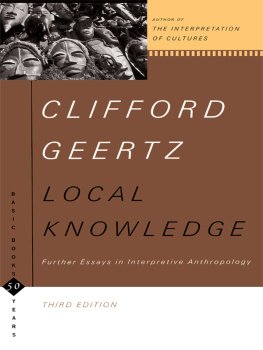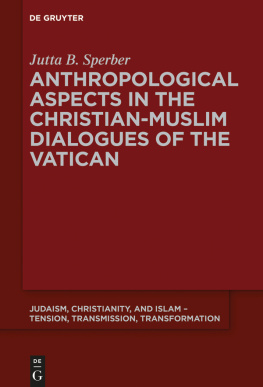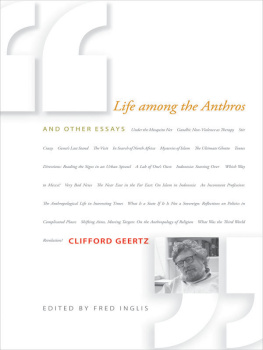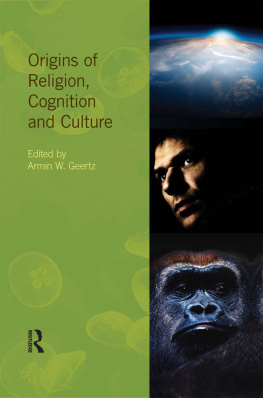Geertz - Available light: anthropological reflections on philosophical topics
Here you can read online Geertz - Available light: anthropological reflections on philosophical topics full text of the book (entire story) in english for free. Download pdf and epub, get meaning, cover and reviews about this ebook. City: Princeton;NJ, year: 2001;2000, publisher: Princeton University Press, genre: Politics. Description of the work, (preface) as well as reviews are available. Best literature library LitArk.com created for fans of good reading and offers a wide selection of genres:
Romance novel
Science fiction
Adventure
Detective
Science
History
Home and family
Prose
Art
Politics
Computer
Non-fiction
Religion
Business
Children
Humor
Choose a favorite category and find really read worthwhile books. Enjoy immersion in the world of imagination, feel the emotions of the characters or learn something new for yourself, make an fascinating discovery.

Available light: anthropological reflections on philosophical topics: summary, description and annotation
We offer to read an annotation, description, summary or preface (depends on what the author of the book "Available light: anthropological reflections on philosophical topics" wrote himself). If you haven't found the necessary information about the book — write in the comments, we will try to find it.
Geertz: author's other books
Who wrote Available light: anthropological reflections on philosophical topics? Find out the surname, the name of the author of the book and a list of all author's works by series.
Available light: anthropological reflections on philosophical topics — read online for free the complete book (whole text) full work
Below is the text of the book, divided by pages. System saving the place of the last page read, allows you to conveniently read the book "Available light: anthropological reflections on philosophical topics" online for free, without having to search again every time where you left off. Put a bookmark, and you can go to the page where you finished reading at any time.
Font size:
Interval:
Bookmark:
Available Light


Anthropological Reflections
on Philosophical Topics
Clifford Geertz

Copyright 2000 by Princeton University Press
Published by Princeton University Press, 41 William Street,
Princeton, New Jersey 08540
In the United Kingdom: Princeton University Press, Chichester, West Sussex
All Rights Reserved
Library of Congress Cataloging-in-Publication Data
Geertz, Clifford.
Available light : anthropological reflections on philosophical topics / Clifford Geertz.
p. cm.
Articles previously published chiefly 19831999.
Includes bibliographical references and index.
ISBN 0-691-04974-2 (CL : acid-free paper)
1. Ethnology. 2. Philosophy. 3. Pluralism (Social sciences). I. Title.
GN345 .G46 2000
306dc21 | 99-054958 |
This book has been composed in Goudy with Bernhard Tango display
The paper used in this publication meets the minimum requirements
of ANSI/NISO Z39.48-1992 (R 1997) (Permanence of Paper)
http://pup.princeton.edu
Printed in the United States of America
10 9 8 7 6 5 4 3 2 1
For

Joan Scott,
Albert Hirschman,
and Michael Walzer
colleagues

VIII. The Pinch of Destiny: Religion as Experience, Meaning, Identity,
Power

As befits two disciplines, neither of which is clearly defined and both of which address themselves to the whole of human life and thought, anthropology and philosophy are more than a little suspicious of one another. The anxiety that comes with a combination of a diffuse and miscellaneous academic identity and an ambition to connect just about everything with everything else and get, thereby, to the bottom of things leaves both of them unsure as to which of them should be doing what. It is not that their borders overlap, it is that they have no borders anyone can, with any assurance, draw. It is not that their interests diverge, it is that nothing, apparently, is alien to either of them.
Beyond their normally oblique and implicit competition for the last word and the first, the two fields share a number of other characteristics that trouble their relations with one another and make cooperation between them unnecessarily difficult. Most especially, both of them are porous and imperiled, fragile and under siege. They find themselves, these days, repeatedly invaded and imposed upon by interlopers claiming to do their job in a more effective manner than they themselves, trapped in inertial rigidities, are able to do it.
For philosophy this is an old story. Its history consists of one after another of its protectorates and principalitiesmathematics, physics, biology, psychology, latterly even logic and epistemologybreaking away to become independent, self-governing special sciences. For anthropology, this contraction of imperium under separatist pressure is more recent and less orderly, but it is no less severe. Having carved out, from the mid-nineteenth century on, a special place for itself as the study of culture, that complex whole including... beliefs, morals, laws, customs... acquired by man as a member of society, it now finds various cooked-up and johnny-come-lately disciplines, semidisciplines, and marching societies (gender studies, science studies, queer studies, media studies, ethnic studies, postcolonial studies, loosely grouped, the final insult, as cultural studies), crowding into the space it has so painstakingly, and so bravely, cleared and weeded and begun to work. Whether as an ancient and honored holding company whose holdings, and honor, are slowly slipping away or as an intellectual high adventure spoiled by poachers, parvenus, and hangers-on, the sense of dispersal and dissolution, of end-ism, grows by the day. Not a particularly felicitous situation for generous interaction and the combining of forces.
Yet, the attempt to so interact and so combine remains well worth making. Not only are the fears exaggerated and the suspicions ungrounded (neither field is about to go away quite yet, and they are less opposed in either style or temper than their louder champions like to imagine), but the stirred up and trackless postmodern seas they are now indeed alike passing through makes them, more and more, in active need of one another. The end is not nigh, or anywhere near, for either enterprise. But aimlessness, a baffled wandering in search of direction and rationale, is.
My own interest in effecting a connection, or strengthening one, or, thinking of Montaigne or Montesquieu, perhaps reviving one, stems not from any interest in altering my professional identity, with which I am as comfortable as could be expected after fifty years struggling to establish it, nor in widening it out to some sort of higher-order thinker-without-portfolio. I am an ethnographer, and a writer about ethnography, from beginning to end; and I dont do systems. But it probably is related, somehow or other, to the fact that, as I explain in the opening chapter, I started out in philosophy but gave it up, after an indecently short time, to ground my thought more directly, as I thought, in the worlds variety. The sorts of issues I was concerned with then, and which I wanted to pursue empirically rather than only conceptuallythe role of ideas in behavior, the meaning of meaning, the judgment of judgmentpersist, broadened and reformulated, and I trust substantialized, in my work on Javanese religion, Balinese states, and Moroccan bazaars, on modernization, on Islam, on kinship, on law, on art, and on ethnicity. And it is these concerns and issues that are reflected, a bit more explicitly, in the reflections here assembled.
Paradoxically, relating the sort of work I doferreting out the singularities of other peoples ways-of-lifeto that philosophers, or at least the sort of philosophers who interest me, doexamining the reach and structure of human experience, and the point of it allis in many ways easier today than it was in the late forties when I imagined myself headed for a philosophers career. This is, in my view, mainly a result of the fact that there has been, since then, a major shift in the way in which philosophers, or the bulk of them anyway, conceive their vocation, and that shift has been in a direction particularly congenial to those, like myself, who believe that the answers to our most general questionswhy? how? what? whither?to the degree they have answers, are to be found in the fine detail of lived life.
The main figure making this shift possible, if not causing it, is, again in my view, that posthumous and mind-clearing insurrectionist, The Later Wittgenstein. The appearance in 1953, two years after his death, of Philosophical Investigations, and the transformation of what had been but rumors out of Oxbridge into an apparently endlessly generative text, had an enormous impact upon my sense of what I was about and what I hoped to accomplish, as did the flow of Remarks, Occasions, Notebooks, and
Next pageFont size:
Interval:
Bookmark:
Similar books «Available light: anthropological reflections on philosophical topics»
Look at similar books to Available light: anthropological reflections on philosophical topics. We have selected literature similar in name and meaning in the hope of providing readers with more options to find new, interesting, not yet read works.
Discussion, reviews of the book Available light: anthropological reflections on philosophical topics and just readers' own opinions. Leave your comments, write what you think about the work, its meaning or the main characters. Specify what exactly you liked and what you didn't like, and why you think so.





